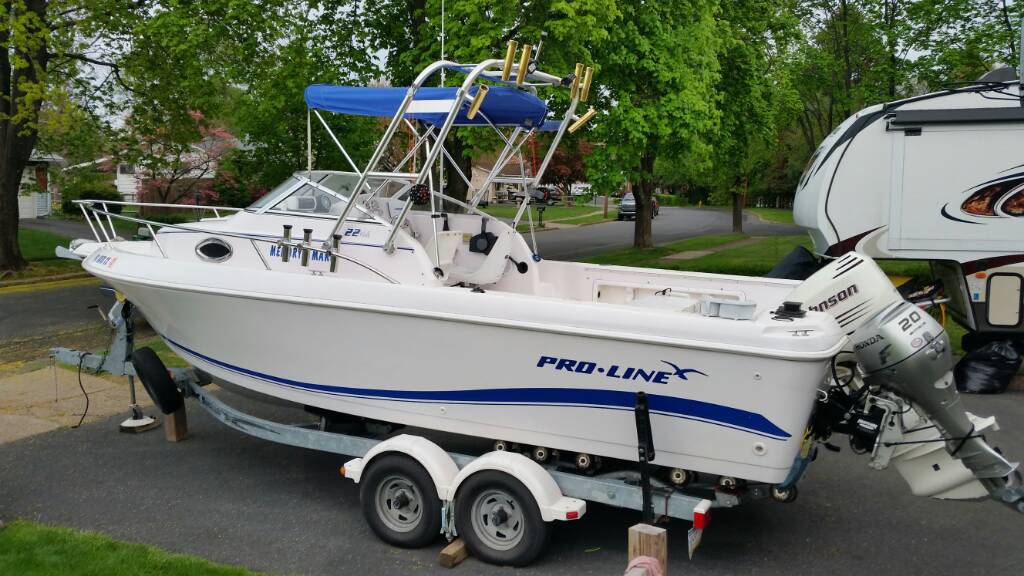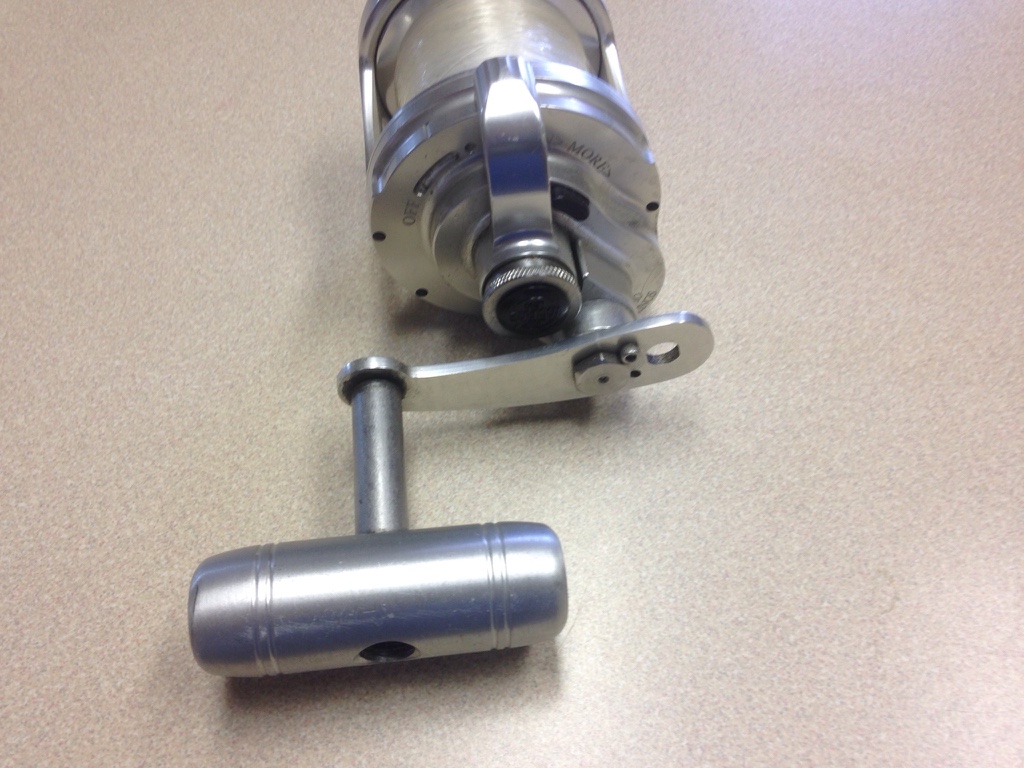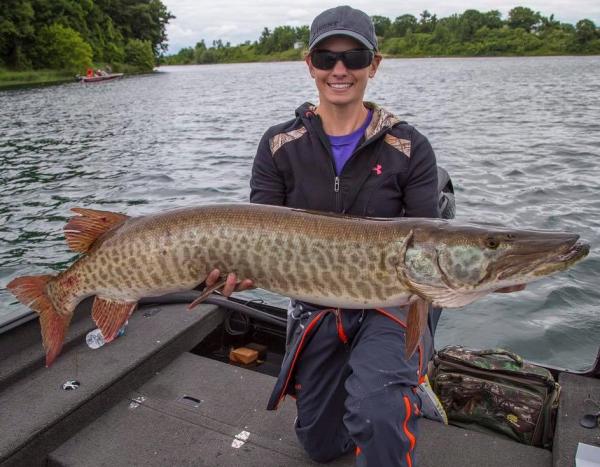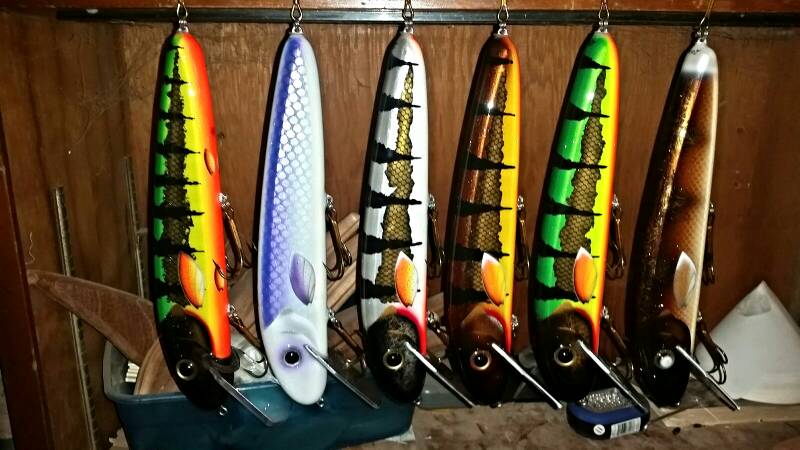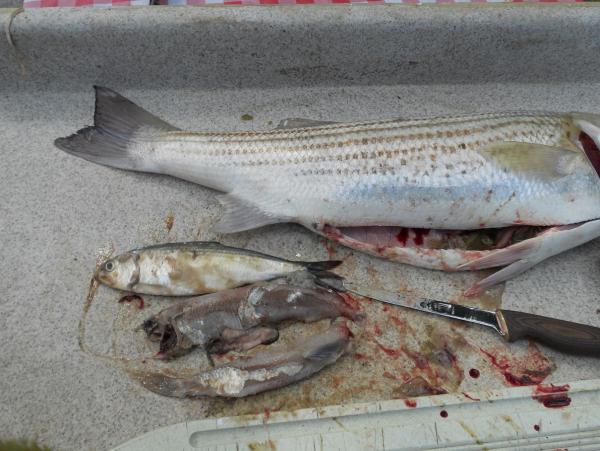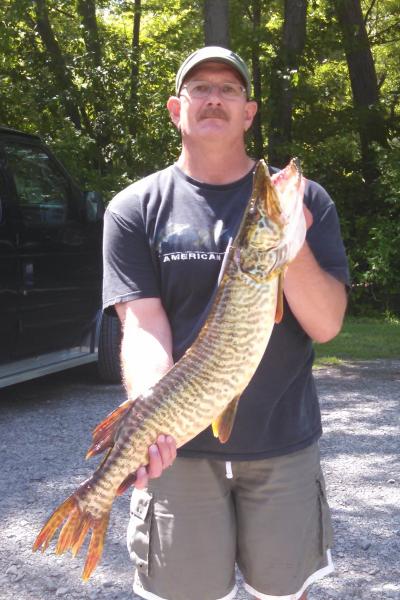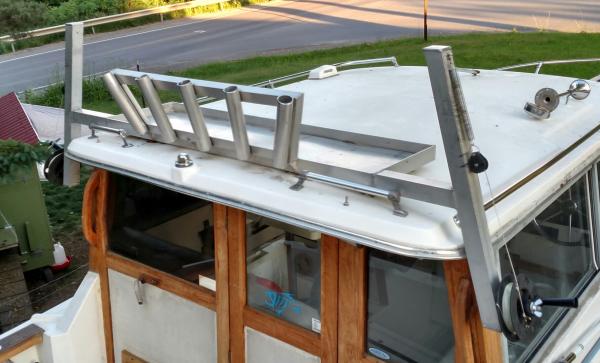-
Posts
1,074 -
Joined
-
Last visited
Content Type
Profiles
Forums
Events
Gallery
Store
Everything posted by muskiedreams
-
Are you in New Jersey? We are just talking about what is done in New York. Please clarify if you are in NJ. They may not be as strictly regulated there. Also it may be different along the Atlantic shore.
-
Familiar Bite is frozen (not live) and reportedly tested and certified to be free of the approx 6 diseases NY requires bait be tested for. I didn't see anything about the origin and or any process used to insure no disease but there must be an acceptable process. It would be interesting to know but maybe it is a trade secret. Since they are certified, it would be legal to transport them and can probably be used anywhere in the state, including lakes that prohibit the use of live alewives. Live alewives are different. First of all they are only allowed to be used for bait in a certain list of lakes in the state (see regulations). Second, they would have to be certified (by the required method of certification) to be free of all the specific diseases as required by the state for live bait. Bait retailers must give a receipt to the purchaser. If the bait is certified, it must be stated on the receipt. These baitfish can be transported over land for ten days. After that they are considered uncertified. Alewives caught in any of the lakes on the list where their use is allowed, can only be used on the lake of origin and cannot be transported from that lake (with the exception of the transportation corridors around Lakes Ontario and Erie and a section of the Hudson River). A bait retailer on one of those lakes is allowed to net and sell them for use on the lake. The receipt must give the lake of origin and it must have a warning that it is illegal to transport that bait over land by motor vehicle (except in the corridors mentioned above). I would be interested to know if the DEC has condoned any whole lake certification. If not, the dealer would have to have a certification method and/or procedure that is accepted by the state for each batch netted from the lake if they want to sell it as certified.
-
I would be curious to know where the certified alewives are from. If they are being raised in a pond or if somehow, each batch netted from the lake is certified. It seems like it would be expensive the certify every batch netted from the lake and there may be a delay in getting the lab results. I don't know if the whole lake could be certified to satisfy the requirement. If they are raised in a pond, it would only have to be certified once per year.
-
I like to go by what is defined in the regulation guide. That is what I have used to explain here what the regulations are. According to the rules, alewives are not allowed to be transported from the lake by anyone via motorized land transportation. Technically you can't even bring them home from the bait shop on the lake and then bring them back to the lake to fish with the next day. It sounds a little crazy but that is how it is written and intended. They are very serious about it because of possible huge negative impacts it can cause. A bait shop can have a license to net them in Cayuga Lake but they can only sell them at and to be used in Cayuga Lake and its tribs to the first barrier. The seller is required to provide a receipt that names the water body in which the uncertified baitfish can be used, and includes a warning to the purchaser that the baitfish may not be transported by car or other motorized vehicle.This is because they are uncertified baitfish. Certified baitfish are baitfish that have been certified through specific laboratory testing to be free of a list of diseases including VHS. It is similar to certifying gamefish for stocking in NY state waters. Certified baitfish can be transported and used in most bodies of water throughout the state. I would think only pond raised baitfish would be practical to certify. I have never heard of anyone raising alewives in ponds. Too hard to maintain the right environment. Like I said, it is best to read the regulations yourself. Here is a link to the baitfish regulation page. http://www.dec.ny.gov/outdoor/47282.html Here is a link to a publication from the DEC that explains the rules in more detail and also explains the reasons for the rules. Look at page 5 through 7 but you might want to read more. http://www.dec.ny.gov/docs/fish_marine_pdf/baitfishofny.pdf
-
Do you have an electric and a battery for it? If you don't and you add it, that could knock off a few mph. Or me in the bow is sure to knock off a few
-
Your friends could be contributing to the spread of an invasive species and possibly the spread of diseases. According to the regulations, if your friends are transporting alewives around the state, they are breaking the law. Alewives cannot be certified as bait in New York State because they are an invasive species and only allowed to be used in the waters they are taken from, PERIOD. Maybe that lady sells other bait that is certified. Or maybe she is selling bait illegally. Also if you read the regulations, in New York State, you can only use alewives in the body of water they are caught in and the only places they can be transported by car is along narrow corridors along Lakes Ontario and Erie and along a narrow corridor along a certain part of the Hudson River. Transporting them anywhere else within the state is illegal even from one finger lake to another and technically, even from one end of a finger lake to the other end by car (by boat is ok). So technically, on the finger lakes, or anyplace in the state other than the transportation corridors, they can only be sold or purchased, on the lake shore (or trib. to first barrier) to be taken directly into the lake they were caught in to be used for bait. I have a friend who has ponds and used to sell fathead minnows to fishermen years ago but now, since he would need to certify his ponds every year, for a fee, it is not worth it to him anymore. It is only worth it now to bait farms who sell mass quantities to bait shops. and hatcheries.
-
I believe they are hard to keep alive, are only sold on and for the waters they are caught from. Since they are not certified bait, they cannot be used on or transported to any other body of water other than the body of water they were caught in. Especially with alewives because they are an invasive species. They are not in all lakes in the state and they don't want them to be introduced into lakes that don't have them. See the rules on baitfish in the regulation guide. Many years ago (more than 20) they used to sell them at the marina at the south end of Canandaigua Lake. I don't know if they still do. They used to pump water from the lake to keep them alive. Also, many anglers who used them were night fisherman and they would just shine a spotlight from the boat into the water that would bring them to the surface and they could just net them.
-
Too many people only care about ME
-

Fishing
muskiedreams replied to proline22's topic in New York Fishing Reports - Lake Ontario (South Shore)
-

For Trade I got a reel to trade
muskiedreams replied to backoneerie2016's topic in Classifieds - Buy, Sell, Trade or Rent
-
Last year we didn't have any meetings between May and Sept. For this year we decided that it was too long of an interval between meetings so we added one on July 18th, which is next Monday at 7pm at the Moose Lodge in Henrietta NY. Our guest speaker will be John Jarosz who is the Conservation Director for the Niagara Musky Association. Over the winter The NMA managed a major project to install four large fish attraction structures on the Upper Niagara River and John headded up the project. These structures each involved placing either large rocks in piles or boulder fields with boulders the size of a small car in strategically selected locations to help provide places where fish of all species could find protection and slack current to hold up in. John will be giving us a power point presentation on the project encompassing everything from the funding and planning, through implementation to completion and locations. The next project he has already started working on is a radio tagging study working with the DEC that will involve implanting transmitters in approximately 20 muskies in the Buffalo Harbor and installing 6 receivers in strategic locations around the harbor. John is a great guy and very passionate and conservation minded. He is always very interested in anything to do with improving musky fisheries and the understanding thereof. He also has been working hard at learning the art of catching muskies on the fly. As always, our meeting are open to anyone who is interested in attending.
-
There hasn't been any reports from Waneta this year, good or bad. Does anyone have anything to report. Any reports or observations will be appreciated. Musky, bass, bait or any other fish. How are the conditions such as temp., water clarity, weeds, algae, etc. Are recreational boaters making it tough? How about Lamoka. They didn't use herbicide on Waneta this year but they did treat Lamoka.
-

Girlfriend's new PB over the weekend
muskiedreams replied to Ronix 51's topic in Musky, Tiger Musky & Pike (ESOX)
-
-
It might depend on what materials you are painting and how you are able to deal with paint dust and/or fumes. There are forums for lure makers that might answer your questions. Here is one that I had bookmarked that is specific to musky lures but they make lures with wood, metal and plastics so they use a variety of different paints. Sometimes it is a matter of preference with wood and plastic lures. http://muskie.outdoorsfirst.com/board/forums/forum-view.asp?fid=25
-

Help... a bearing buddy keeps falling off
muskiedreams replied to Todd in NY's topic in This Old Boat
It not only has to fit tight. It must be a good seal as well. The grease is pressurized by the spring after it is pumped with grease. If it is not well sealed, it will leak and get all over your wheel. So if you do something like skipper19 mentioned above, you may need to also use a sealant that is resistant to heat and grease. -
-
-
-
Too many lake associations act without understanding or monitoring the results of what they are doing. I have never read anything credible that indicates bass or walleye and other warm water species will do better without tigers or muskies. Maybe if there is limited baitfish. I have read actual case studies that indicate the opposite. There has even been studies that indicate bass and walleye, perch and baitfish doing better where tigers or muskies are stocked. They can have big impact on native trout in a small river and in some lakes. Stopping the tiger stocking may or may not be the reason the bass are running smaller there now. Fishing pressure, tournaments with post release mortality, habitat destruction, early season targeting of bass while they are spawning and/or other unknowns could all be factors.
-
-
-
Here are the results. There were 30 participants with a total of 19 fish caught. 1st Place and Big Fish: Mike Deponceau, 30 points. His fish were, 44" and 37.5" 2nd Place: Frank Alcorn, 24 points. His fish were 34.5", 30.5", and 35.5". 3rd Place: Alexandra Palo, 19 points. Her fish were 35.75" and 35". I believe Alexandra is the first female and first junior angler to win a prize in a MI Chapter 69 tournament. Alexandra's brother, Thomas and her father, Dave each caught a fish as well. Mike and Frank were fishing partners. So if you add up the fish caught on both those boats together, it equals 9 which is almost half of all fish entered. You might say those two boats had a good day, despite the tough bite.
-

How to eliminate automatic notifications from
muskiedreams replied to retsey's topic in Open Lake Discussion
Select unfollow for the forum or topic you are receiving notices for.


